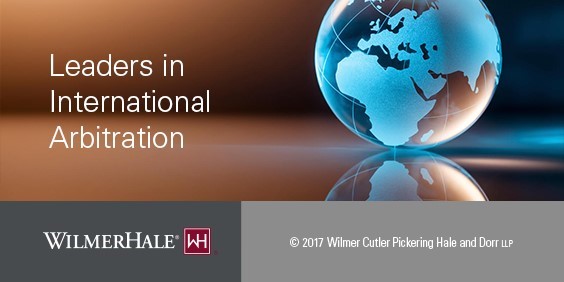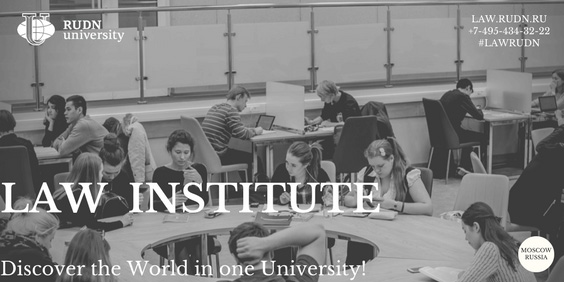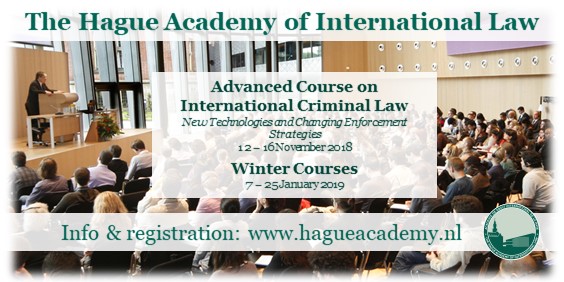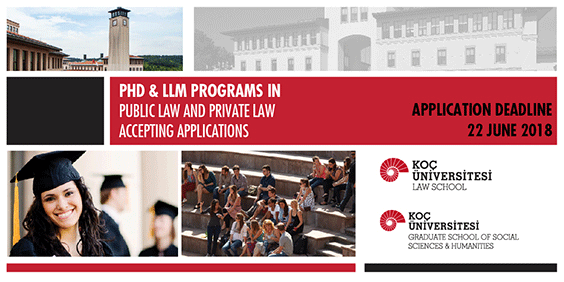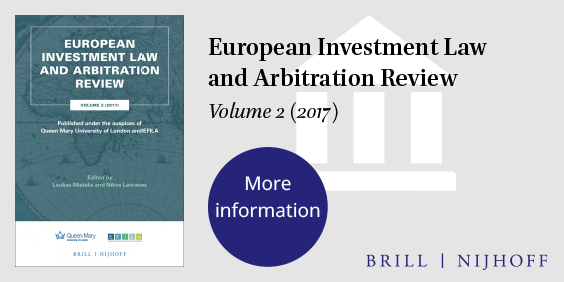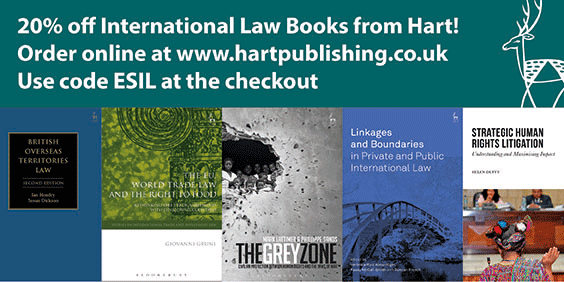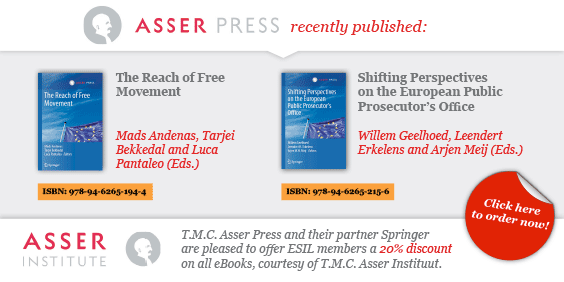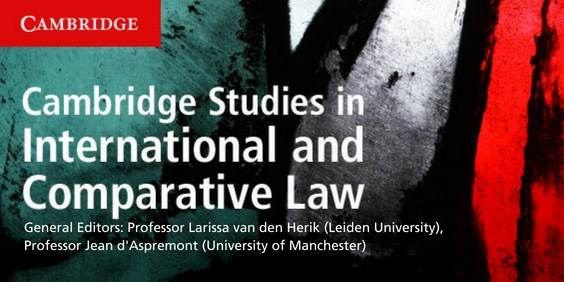ESIL Newsletter June 2018

 In this issue
In this issue
1. President’s Message: Manchester – A Universal ESIL Conference

Luis M. Hinojosa-Martínez
The next big event in the ESIL calendar is the 2018 European Society of International Law Conference on ‘International Law and Universality’ (13-15 September) in Manchester. You can already consult the excellent cast of speakers in the programme.
If you look at the conference website, the first phrase presenting the subject of Universality explains that we will take ‘a hard and unflinching look at the multitude of roles and functions played by universality in international legal discourses as well as its associated narratives of progress and virtues’. The last phrase of the same text strikes the reader with a challenging idea: ‘the invocation of universality has come to arouse suspicion among international lawyers. For many TWAIL and post-colonialist theorists, “whoever invokes universality wants to cheat”’. These two sentences show both the rich theoretical debate that lies behind the theme of the conference and the radically different views that these competing narratives have for the interpretation of specific legal issues and of international politics in general.
And it is relevant that this debate takes place in Manchester, one of the main starting points of the industrial revolution that generated the take-off of Western economic development and European world leadership, which had as one of its alleged corollaries the western origin of current international law. While the universal scope of international law is usually questioned outside Western countries because of this original sin, the challenge to universality in Europe mainly comes from those who criticize the harmful effects of globalization and the democratic deficit in the creation of international norms. The organizers have taken care to make sure that these different perspectives are present in the Manchester ESIL conference that also includes representatives from a constitutional/ cosmopolitan view of the international legal order conceived as an instrument of democratization, peace-making and defence of human rights.
The discussion about universalism comes at a particularly relevant time when an isolationist US President seems to have renounced leading the defence of universal values substituting them with a personal nativist conception of the national interest; meanwhile the European Union with a universalist heart and tradition has problems to find its role in this new international scenario. Can the EU effectively rely on countries as diverse as China, India, Brazil, and others to build a consensus that will save the multilateral trading system from protectionist threats? Is Europe capable of constructing an external policy that coherently fosters respect for universal human rights? Is it possible to maintain that the UN collective security system universally prohibits the use of force with strict exceptions after the Syrian ‘civil’ war? Let us hope to find some answers in Manchester.
Twelve ESIL Interest Groups have organized in Manchester very interesting pre-conference events that will allow early arrivals to enjoy debates in petit comité. The definitive programmes for each event will appear in due course on the ESIL website and on the Manchester conference website. Let me underline the attractiveness of the genuine scientific debate that takes place in the ESIL Interest Groups, one of the most innovating areas of ESIL activities.
Many of the readers already know that the 2019 ESIL Research Forum will take place at Göttingen University on 4-5 April 2019 with the title: ‘The International Rule of Law and Domestic Dimensions: Synergies and Challenges’. Those waiting for the Call for Papers should expect it in June. The scientific proposal challenges the traditional perspective that views the development and progressive codification of international law as reinforcing both the international and the domestic rule of law. Recent examples of backlash against international courts’ decisions or international law more generally question this synergy and present the international and the national rule of law as antagonists. We have thought that it is a good time to reassess the international conceptions of the rule of law and its impact on domestic legal orders.
Finally, let me remind you that 2018 is an election year for the ESIL Board. The 2018 General Assembly of the Society will elect seven Board members. The election will be held on Friday 14 September 2018 during the ESIL Annual Conference in Manchester. Eligible candidates should be willing to vigorously contribute to the Society and have an active knowledge of one of the official languages of the Society and at least a passive knowledge of the other. Being a Board member involves a considerable and generous amount of work but enables you to make a relevant contribution to exchanges of ideas on matters of common interest to international lawyers all throughout Europe and elsewhere. The ESIL Board wishes to send a message to our membership encouraging gender balance and geographical diversity when voting in this election.
I am looking forward to meeting you at a future ESIL event,
Luis M. Hinojosa-Martínez
hinojosa@ugr.es
2. Guest Editorial: Is Expulsion of Members of the Council of Europe a Good Idea?

by Kanstantsin Dzehtsiarou, University of Liverpool
Growth of mutual mistrust, xenophobia, isolationism and some would even argue the return of the Cold War era in Europe makes the operation of the Council of Europe difficult. Its raison d’être is to promote cooperation and integration between its members in the areas of human rights, democracy and rule of law. It seems that some signs of crisis within the Council of Europe are already clearly visible.
Some states fail to genuinely collaborate with the Council. Russia, for example, failed to pay its budgetary contributions and for a few years now has not been participating in the work of the Parliamentary Assembly. Turkey decided to reduce its contribution to the budget of the Council o as a retaliation for light (some might even argue inappropriately light) criticism of gross human rights violations that happened there. Azerbaijan was in the centre of a corruption scandal within the Parliamentary Assembly. There are instances of blatant incompliance with judgments of the European Court of Human Rights or even, as in Russia, the creation of an institutional mechanism of avoidance of compliance with such judgments. In these circumstances, the statutory bodies of the Council of Europe need to react to this growing crisis.
Now is a good time to discuss the legality and legitimacy of suspension and expulsion of members of the Council of Europe. From the legal point of view, suspension is not a hugely burdensome process. The Committee of Ministers is entrusted with the competence to initiate the suspension procedure which should be done in consultation with the Parliamentary Assembly of the Council. After suspension, a member state can ask to withdraw, or it can be expelled from the Council. The Statute of the Council of Europe leaves broad margin of discretion to the Committee of Ministers in deciding when and for what reason the suspension procedure should be initiated. It seems that the Council’s statutory bodies need to be pragmatic and ensure the effectiveness of the organisation when discussing possible suspensions and it is suggested that three sets of circumstances should be taken into account.
First, the legitimacy of the Council of Europe should be ensured. The statutory bodies need to consider whether the continuing presence of a member state in the Council causes more damage to its legitimacy than a one-off suspension and expulsion would cause. This balance is not an exact science but damage to the organisation’s legitimacy is identifiable from, for example, a clear lack of genuine collaboration with the organisation or disrespect for democracy, human rights and rule of law.
Second, the level of protection of human rights in the member state in question should be considered. Obviously, individuals and groups under the jurisdiction of a member state will lose their opportunity to apply to the European Court of Human Rights after this member has been expelled. The Statutory bodies need to consider if the European Court is capable of changing human rights standards in the state in question at a strategic level. If this is not happening, then there is a good case in favour of expulsion of such a member state.
Finally, a less important set of circumstances includes the financial repercussions for the Council. These circumstances cannot trump the first two but they should be taken into account as the Council requires funding to continue its important work. The statutory bodies should consider whether the budgetary contributions of a particular state can outweigh the fact that this state does not effectively participate in the work of the Council of Europe.
3. 2018 ESIL Annual Conference

There are now less than three months to go until ESIL members meet up in Manchester (13-15 September). As you can see from the programme, there are many events planned – Interest Group events, keynote lectures, discussions, a range of fora and agorae, as well as the annual General Assembly with the election of new Board members.
If you plan to come to Manchester, please don’t wait until the last minute to register – places are limited, both at the conference and at the conference dinner at Old Trafford. In particular, student members who plan to take advantage of the limited number of reduced fees are advised to register today to avoid disappointment; most of the places have now been booked. Register now.
The Marketing Manchester Convention Bureau is the official accommodation provider for the conference and you can use their services if you wish. Full details.
4. Forthcoming ESIL-sponsored events

ESIL is a global, member-driven society, dedicated to fostering inquiry, discussion and innovation in international law, and promoting a greater understanding of the role of international law in the world today. In that respect, several ESIL-sponsored events are coming up in the next few months.
If you wish to request ESIL sponsorship for an event you are involved in organising, full details online.
ESIL-sponsored event, Brussels
The Leuven Centre for Global Governance Studies will host the ESIL-sponsored international conference on The Belt and Road Initiative and Global Governance on 31 August 2018 in Brussels. China’s Belt and Road Initiative (BRI) may well have significant geopolitical and geo-economic consequences. Spanning 65 different countries, including a series of EU Member States and potentially Latin America, covering 60% of the world’s population and a large portion of the world economy, it holds the potential to redefine the global economy and global governance. In what ways is the BRI impacting or likely to impact the current international financial institutions, trade rules, human rights, sustainable development, climate change and environmental protection, security, and developmental policies? Further details
ESIL-sponsored event, Cambridge
A workshop on Rethinking Reparations in International Law will be held in November 2018 at the Lauterpacht Centre, University of Cambridge. What role do reparations play in international law today? What is the theory behind reparations in different areas/systems of international law? Do reparations play a different role in different areas of international law (human rights, investment law)? How are reparations chosen by judges and arbitrators and how are damages calculated? What is the link between efficiency and reparations? How can reparations be made more efficient? How do judges/arbitrators understand their role in relation to reparations? Further details.
5. ESIL Reflections
ESIL Reflections offer up-to-date reflections on current issues in international law. The Reflections are now in their fourth year, covering a wide range of topics relating to current developments in international law and practice as well as theoretical reflections in a way that is relatively accessible to non-experts. The aim is to foster discussion between ESIL members and international law scholars and practitioners more generally – in Europe, but also beyond. ESIL Reflections are published monthly on this website and distributed freely to ESIL members.
The editors are Samantha Besson, Jean d’Aspremont (editor-in-chief), Jan Klabbers and Christian Tams. ESIL Members who have an interest in contributing are encouraged to do so. Please contact Jean d’Aspremont if you would like to contribute.
Latest publications:
- When International Law Distracts: Reconsidering Anti-Corruption Law
by Lys Kulamadayil - International Human Rights Law and Mirrors by Samantha Besson
6. News from Interest Groups
ESIL Interest Groups are a vital part of the Society’s success and activities. A list of the groups is available on the ESIL website.
Pre-conference Interest Group events will be organised at the annual conference in Manchester. The following programmes are already available:
- IG International Economic Law: International Economic Law in 2018: Between Reform and Contestation. PROGRAMME
- IG Business and Human Rights: Rethinking limited liability in light of the universality of human rights. PROGRAMME
- IG International Bio Law: The Role of International Organizations and International Courts in this Field. PROGRAMME
- IG on the EU as a Global Actor: The European way, universality and fragmentation of international law. PROGRAMME
- IG International Human Rights Law: The Universality Challenge to Human Rights Law: a Sword, a Shield, or Neither.PROGRAMME
- IG International Courts and Tribunals: Access to International Adjudication. PROGRAMME
- IG History of International Law: Consumers or Producers of international law? Non-European experiences with the law of nations in comparative perspective. PROGRAMME
- IG International Organisations: Case Studies on International Organisations and Universality.PROGRAMME
- IG Law of the Sea: International Law of the Sea and Universality. PROGRAMME
- IG on feminism and international law with WILNET. PROGRAMME
Call for Papers:
- IG Migration and Refugee Law: The Shaping Up of the UN Global Compacts on Migration and Refugees. Progression towards or Retreat from a Universal Agenda?Call for Papers. Deadline for submissions: 30 June 2018
OTHER NEWS FROM THE INTEREST GROUPS:
ESIL IG on International Business and Human Rights
The discussion during the pre-conference IG event Manchester will focus on the latest developments in the field of business and human rights from three perspectives. Firstly, significant recent developments from national and regional courts will be discussed, such as the ILVA Case before the European Court of Human Rights and the Shell Cases in the UK and Netherlands. Secondly, the Workshop explores States’ obligations to protect human rights that arise under treaties such as the trade agreements concluded by the European Union and certain conventions of the law of the sea. Thirdly, the focus will turn to a theoretical discussion about the relationship between the universality of human rights and the concept of limited liability, by exploring avenues for reconstructing the concept of limited liability in light of the universality of human rights.
ESIL IG on International Economic Law
Forthcoming in the Open Access Online Journal “Brill Open Law” are the papers presented in the panel devoted to “Investment Law and Access to Water” of the ESIL IEL IG Workshop on “Global Public Goods, Global Commons, Fundamental Values: The Responses of International Economic Law” held in Naples in September 2017.
In November 2018, the ESIL IEL IG will hold an international conference in Ravenna devoted to the new generation of EU free trade agreements, preceded by a Call for papers.
ESIL IG on International Health Law
In January 2018 Stéphanie Dagron, University of Geneva, and Pedro A. Villarreal, Max Planck Institute for Comparative Public Law and International Law, were elected as additional members of the Coordinating Committee to work alongside the current members of the CC, Gian Luca Burci, Graduate Institute of International and Development Studies of Geneva, and Stefania Negri, University of Salerno. For further information the Coordinating Committee can be contacted at the e-mail address esil.igihl@gmail.com.
The Interest Group on International Health Law has launched a Call for Papers for the International Conference “Health and the Environment in International Law: Actors, Norms and Responsibilities“, co-organized with the Max Planck Institute for Comparative Public Law and International Law, the ESIL Interest Group on International Environmental Law, and the Jean Monnet Chair in European Health, Environmental and Food Safety Law. The conference will be held on 17-18 October 2018, at the Max Planck Institute for Comparative Public Law and International Law, Heidelberg, Germany. The deadline for the submission of abstracts is 30 June 2018 and the final programme of the conference will be announced to all ESIL members and published on the IG website in July.
ESIL IG on Migration and Refugee Law
As a result of elections held in March 2018, a new member joined the Coordinating Committee of the IG: Daniela Vitiello (University of Florence). She will work alongside the current IG conveners Kristof Gombeer, Tamas Molnar and Tom Syring who will remain on the Committee for a further two years. The next Coordinating Committee elections are planned for January 2020.
On the occasion of the XXIII Annual Conference of the Italian Society of International and EU Law (ISIL) on the Codification in International and EU Law (6-8 June 2018 – University of Ferrara), the ISIL Interest Groups on International and European Law on Human Rights (DIEDU), International and European Law on Migration and Asylum (DIEMA) and Law of International Litigation, in collaboration with the ESIL IG on Migration and Refugee Law and the Department of Law of the University of Ferrara, organised a round table on “Human Rights in Turkey: Which Role for International and EU Law?”
The pre-conference IG event in Manchester will discuss various legal questions and implications of the two Global Compacts on Migration and Refugees, which are currently being negotiated under the aegis of the UN. (See above for Call for Papers).
The latest newsletter of the Interest Group (No. 13 – May 2018 ) has been recently published on the IG’s website.
ESIL IG on EU as a Global Actor
The papers that will be presented in the Manchester pre-conference IG event will focus on different areas of international law in order to provide the starting-point for comparison as well as an overall assessment of the impact of international law and universalism on the law and practice of the EU. Four panellists (from different EU Member States ranging from North to South and East to West) will analyse the practice of the EU’s judiciary and/or legislators with regard to particular areas of international law. They seek to assess the EU institutions’ interactions in those areas (where appropriate) and place their findings in the broader context of scholarship on the autonomy of the EU legal order, universality and fragmentation of international law. While the first two presentations analyse the role of the EU Institutions (with a focus of the CJEU) in contributing to international law, the second two papers use this as a basis to zoom in on two key and topical fields of law: migration and trade. The presentation and discussion of papers will be followed by a general discussion about the IG’s objectives and activities.
ESIL IG on International Legal Theory and Philosophy
The panel proposal for the 2018 ESIL Annual Conference was selected for the main conference. Our agora panel is on “Transcendent principles and pluralism in international law: the complex, the simple, and the universal” with an excellent line up of speakers. We welcome conference delegates to join us in the discussions. Details of the agora panel can be found in the conference programme.
